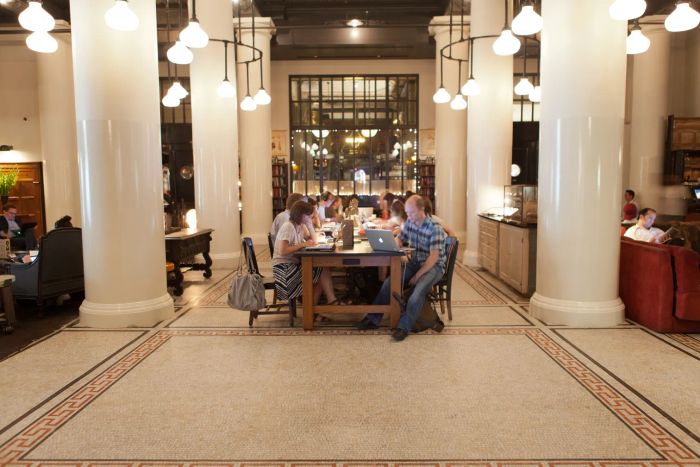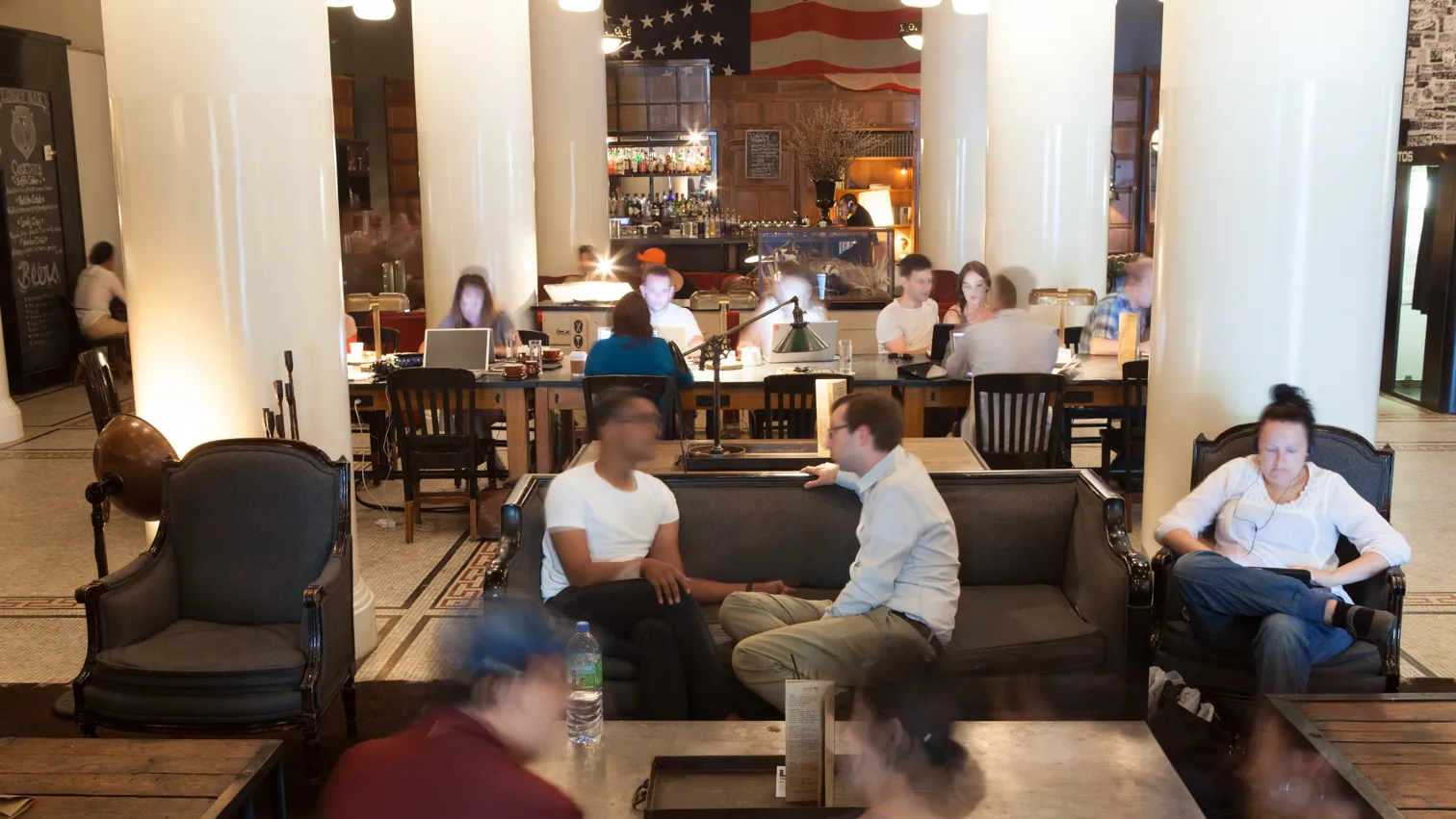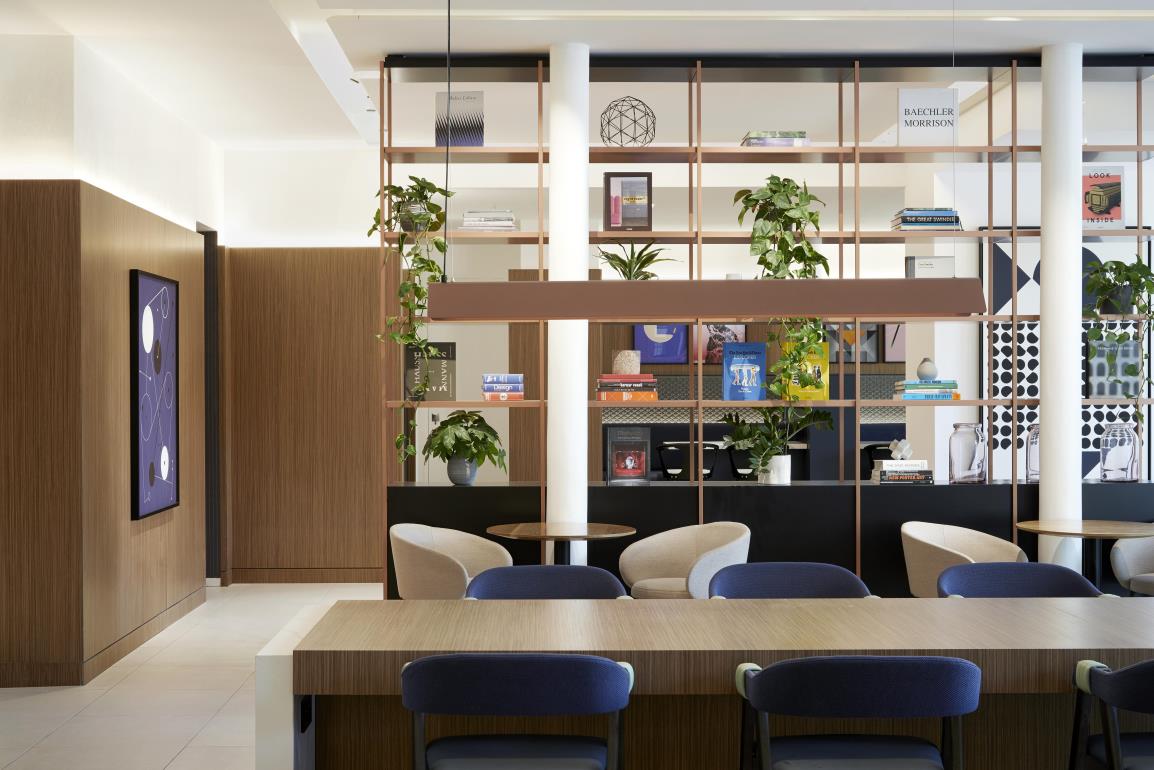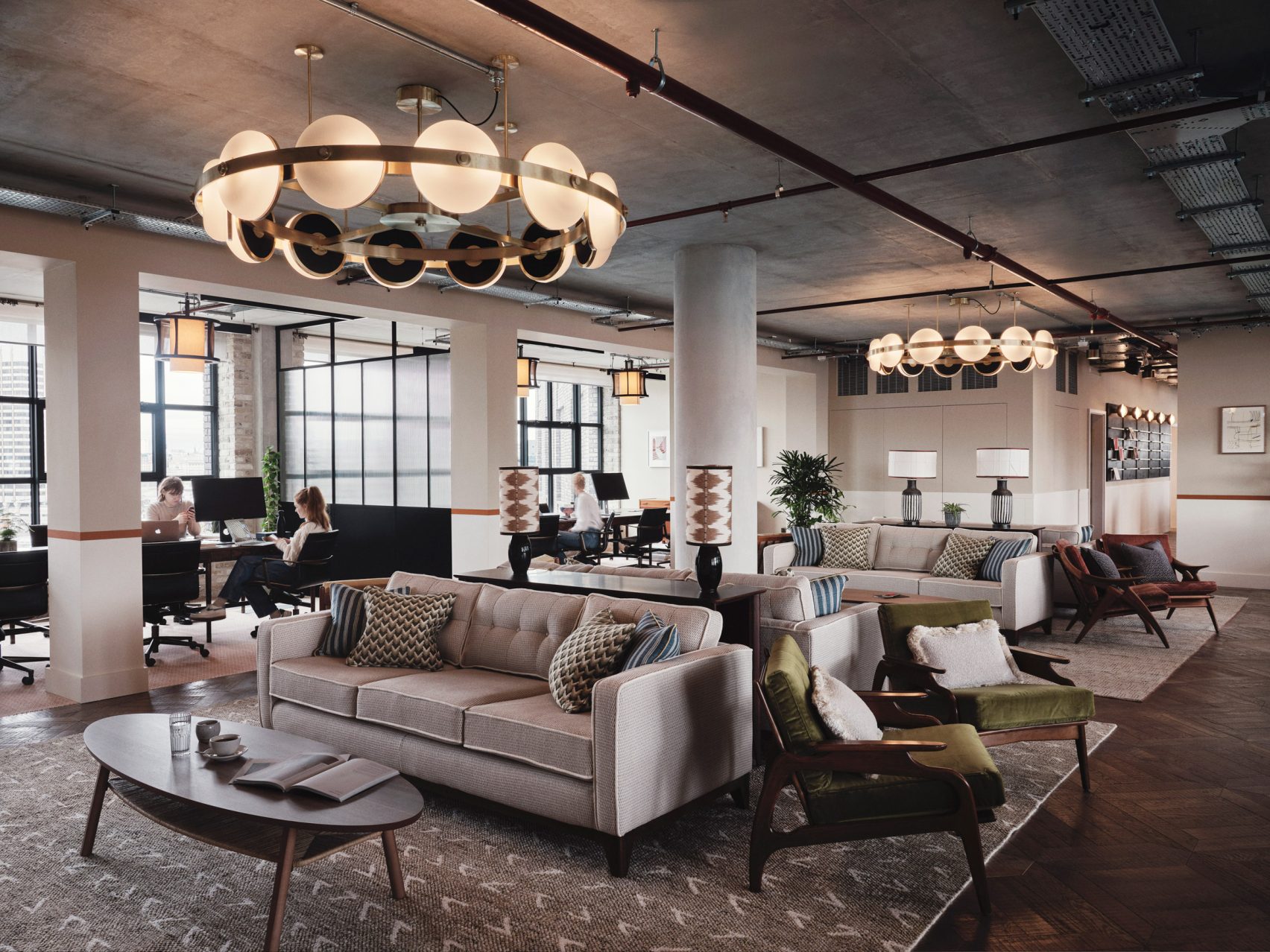
Innovating Hotel Spaces for the Modern Workforce: Crafting Coworking-Friendly Environments
Innovating Hotel Spaces for the Modern Workforce: Crafting Coworking-Friendly Environments
6 Guest Behavior Trends in Hotel Design in 2024
6 Hotel Technology Trends in 2024
New Hotel Brands and What We Can Learn About the Growing Trends in the Hotel Business

Introduction
The modern workplace is no longer confined to a single location. With the rise of remote work, digital nomadism, and flexible work schedules, people work from anywhere and everywhere. Hotels, once seen primarily as places for rest, are now evolving to meet the needs of this new workforce by integrating coworking spaces into their environments. These coworking-friendly spaces in hotels are more than just a trend; they represent a significant shift in how we view the relationship between work and leisure.
By merging hospitality with productivity, hotels can offer a unique experience that attracts a diverse clientele, from business travellers to local freelancers. In this article, we'll explore how to create coworking-friendly spaces in hotels, diving into the psychology of space, multifunctional design, inclusivity, community building, wellness, sustainability, and more.
As hotels evolve to cater to the needs of the modern workforce, it's essential to consider how these spaces can be further personalized for guests. Personalized hotel rooms can enhance the guest experience, making them feel more connected to their environment. Additionally, incorporating the latest guest behavior trends can provide insights into designing spaces that truly resonate with today's travelers.
The Psychology of Space: Designing for Productivity and Well-Being
Designing a coworking space within a hotel requires an understanding of how the environment influences work efficiency and well-being. It's not just about placing desks and chairs; it's about creating an atmosphere that fosters creativity, focus, and collaboration.
Understanding the Connection Between Environment and Work Efficiency
The design of a space can significantly impact a person's ability to work effectively. Colours, for example, play a crucial role in influencing mood and productivity. Warm tones like yellow and orange can boost creativity, while cooler tones like blue and green are known for their calming effects. Incorporating biophilic design—elements that connect people with nature, such as indoor plants, natural light, and organic materials—can reduce stress levels and enhance overall well-being.
Ergonomics Meets Aesthetics
While aesthetics are important, furniture's functionality should not be overlooked. Ergonomic chairs that support the spine, adjustable desks that cater to different working styles, and comfortable seating arrangements are essential. The goal is to create an inviting space and conducive to productivity.
Creating an Atmosphere of Focus and Flow
Lighting, acoustics, and air quality are vital components in designing a productive workspace. Natural light is ideal, but where it's not possible, adjustable LED lighting that mimics natural cycles can help maintain focus. Soundproofing and quiet zones are essential for minimizing distractions, while proper ventilation ensures a fresh and healthy environment. Adding sensory elements like calming scents and soft textures can further enhance the coworking experience, making it more enjoyable and immersive.
Multifunctional Spaces: Flexibility and Adaptability at the Core
Space is often at a premium in a hotel setting, meaning that coworking areas must be flexible and multifunctional. These spaces should be designed to serve multiple purposes, allowing for seamless transitions between work and leisure.
Transforming Traditional Hotel Areas into Dynamic Workspaces
Reimagining existing areas is one of the most innovative approaches to creating hotel coworking spaces. Lobbies, lounges, and unused corners can transform productive work environments. Modular design solutions, such as movable walls and convertible furniture, allow spaces to adapt to different daily needs. For instance, a breakfast area in the morning can become a vibrant coworking space in the afternoon and a social lounge in the evening.
Blurring the Lines Between Work and Leisure
Modern workers often seek environments that allow them to work efficiently while offering opportunities to relax and recharge. Designing spaces that blur the lines between work and leisure can cater to this need. Consider integrating coworking areas with spas, gyms, or poolside lounges. The concept of "hospitality" combines a coworking space's productivity with a hotel's luxury and comfort, creating a unique experience that appeals to both business and leisure travellers.
The Role of Technology in Flexible Workspaces
Technology is the backbone of any coworking space. High-speed Wi-Fi, abundant power outlets, and state-of-the-art conferencing tools are non-negotiable. But beyond these basics, consider integrating smart technologies that allow for a more personalized and efficient work experience. Imagine a workspace where the lighting adjusts to your preferences or you can book a meeting room with a simple voice command. The future of coworking lies in adaptive environments that use AI to cater to the individual needs of each guest.
Catering to Diverse Worker Profiles: Inclusivity and Personalization
A successful coworking space in a hotel must cater to diverse worker profiles, from digital nomads to local professionals. Inclusivity and personalization ensure everyone feels welcome and can work comfortably.
Designing for the Digital Nomad
Digital nomads are a growing demographic, and they have specific needs that go beyond the typical coworking setup. Consider offering secure storage options, such as lockers, for those who are constantly on the move. Personal pods or phone booths can provide privacy for calls or focused work. Flexibility is also crucial—spaces should be accessible 24/7, with varied seating arrangements allowing nomads to choose their best work.
Meeting the Needs of Local Professionals and Business Travelers
Local professionals and business travellers often require more formal settings for meetings and focused work. Private meeting rooms, quiet zones, and executive suites with all the necessary business amenities are essential. Additionally, concierge services tailored to business needs—such as printing, courier, and administrative support—can separate your coworking space.
Embracing Neurodiversity in Coworking Design
Inclusivity also means considering the needs of neurodiverse individuals, who may require different environments to thrive. Design strategies such as sensory rooms, varied seating options, and customizable workstations can create a welcoming environment for everyone. Offering different zones within the coworking space—some vibrant and stimulating, others calm and quiet—ensures that all work styles and preferences are catered to.
Designing for Interaction and Community Building
Coworking spaces are not just about providing a place to work but also about fostering connections and building a sense of community. Hotels have the unique opportunity to create vibrant social hubs that go beyond the typical coworking experience.
The Power of Social Spaces
Communal areas are essential for fostering collaboration and networking. These can be designed as informal meeting spots like coffee bars, lounge areas, or rooftop terraces. The goal is to create spaces where spontaneous interactions can occur, whether it's over a cup of coffee or during a break on the terrace. The design of these areas should encourage movement and conversation, with comfortable seating and inviting layouts.
Hosting Curated Events and Workshops
Hotels can leverage their coworking spaces to host various events catering to their guests' interests. From skill-sharing sessions and guest lectures to creative workshops and networking events, these activities provide value to guests and create a vibrant and dynamic atmosphere. Partnering with local businesses and influencers can further enhance the appeal of these events, offering unique experiences that guests wouldn't find elsewhere.
Building a Coworking Culture Within the Hotel
Creating a sense of belonging and community among transient guests can be challenging, but it's not impossible. Encouraging interaction through shared experiences, such as group activities or themed nights, can help build a coworking culture within the hotel. Providing regular opportunities for guests to connect and collaborate enhances their experience and fosters a loyal customer base.
Wellness and Sustainability: The New Pillars of Coworking Design
As the demand for wellness and sustainability grows, hotels can integrate these elements into their coworking spaces, creating environments that not only support productivity but also promote overall well-being and environmental responsibility.
Integrating Wellness into the Coworking Experience
Wellness-focused coworking spaces are becoming increasingly popular, offering amenities such as meditation rooms, yoga studios, and fitness centres. These spaces allow workers to care for their physical and mental health while staying productive. To enhance the coworking experience, consider offering wellness programs and services, such as on-site health coaches, nutrition plans, and mental health resources.
Designing for Sustainability and Eco-Consciousness
Sustainability is no longer just a buzzword; it's a critical consideration for many guests. Hotels can lead the way by designing coworking spaces that prioritize eco-friendly practices. This could include using sustainable materials, implementing energy-efficient technologies, and creating green spaces like indoor gardens or rooftop farms. Eco-friendly amenities, such as refillable water stations and recycled paper products, can further enhance the appeal of your coworking space.
How Sustainability and Wellness Drive Guest Loyalty
Guests are increasingly looking for spaces that align with their values, and coworking spaces that prioritize wellness and sustainability can help drive guest loyalty. Case studies from hotels that have successfully merged coworking with these principles show increased guest satisfaction, repeat visits, and positive reviews, ultimately contributing to the hotel's bottom line.
Marketing Coworking Spaces in Hotels: Strategies for Success
Creating a coworking space is just the beginning; marketing it effectively is essential to attract the right audience and maximize its potential.
Targeting the Right Audience
Understanding your target audience is key to successful marketing. Digital platforms offer powerful tools for reaching remote workers, entrepreneurs, and business travellers. Personalized marketing campaigns that speak directly to the needs of these groups can help differentiate your coworking space from competitors. Highlighting unique features, such as wellness programs or sustainability initiatives, can attract guests who value these aspects.
Pricing Models and Membership Options
Offering flexible pricing models is crucial for catering to different guest segments. Consider implementing pay-as-you-go options for short stays, subscription-based models for regular users, and hybrid packages that combine coworking with hotel services. Offering exclusive perks and rewards, such as discounts on food and beverages or access to premium amenities, can also help attract and retain guests.
Partnerships and Collaborations
Collaborating with coworking brands, tech companies, and wellness providers can enhance the visibility and appeal of your coworking space. Co-branded events and experiences, such as product launches, tech demos, or wellness retreats, can attract new customers and create buzz around your coworking offering.
Case Studies: Trailblazing Hotels Leading the Coworking Movement
Looking at real-world examples can provide valuable insights into what works and what doesn't when creating coworking spaces in hotels.
Example 1: Crowne Plaza’s Plaza Workspace
 Crowne Plaza® Hotels & Resorts showcases new design for public spaces
Crowne Plaza® Hotels & Resorts showcases new design for public spaces
Crowne Plaza’s Plaza Workspace is all about making work on the road a breeze. They’ve turned the typical hotel lobby into a cool, flexible spot where you can get stuff done or just chill out. Whether you’re looking for a private booth to focus, a big table for meetings, or a comfy corner to relax, Plaza Workspace has you covered. With smart tech, plenty of outlets, and a modern vibe, it’s perfect for business travelers who want a place that’s as practical as it is comfortable. Crowne Plaza has made it easy to work and unwind, all in one stylish space.
Example 2: Hoxton Hotel’s Holistic Workspaces
 Co-working in Hoxton Hotel in its Southwark-based hotel
Co-working in Hoxton Hotel in its Southwark-based hotel
The Hoxton Hotel is the perfect spot for mixing work and play. Their lobbies are super inviting, with comfy chairs, plenty of outlets, and a laid-back vibe that makes you want to stay all day. It’s become a favourite hangout for locals and travellers who need to do some work but also want to enjoy the cool, friendly atmosphere. Whether you’re catching up on emails or meeting up with friends afterwards, the Hoxton makes it easy to feel right at home while staying productive.
Example 3: Accor Hotel's Wojo Co-working Spot Concepts
Designed by Tetris , Wojo is revolutionizing the coworking scene integrated into Accor Hotels. It offers flexible, vibrant spaces that cater to a wide range of professionals. Whether you need a quiet spot to focus, a collaborative environment to brainstorm, or a cosy corner to meet with clients, Wojo has it. Their spaces are thoughtfully designed to balance productivity with comfort, featuring everything from ergonomic furniture to energizing communal areas. Plus, with locations often integrated into Accor hotels, Wojo makes it easy for travellers to find a place to work no matter where they are. It's a smart, stylish solution for anyone looking to blend work with a bit of life’s comfort.
Overcoming Challenges in Creating Coworking Spaces in Hotels
Creating coworking spaces in hotels comes with its own challenges, from managing space allocation to ensuring a consistent guest experience.
Balancing Coworking Needs with Traditional Hotel Operations
One of the biggest challenges is balancing the needs of coworking guests with those of traditional hotel guests. This requires careful planning and design to manage space allocation, noise levels, and privacy concerns. For example, soundproofing coworking areas and creating separate entrances can help minimize disruption to other guests.
Ensuring Consistency in Guest Experience
Maintaining high service standards across both coworking and traditional hotel areas is essential. Staff training is crucial to ensure that they can support the unique needs of coworking guests, whether it's troubleshooting tech issues or providing business services. Consistency in service quality helps build trust and ensures a positive guest experience.
The Future of Coworking in Hotels: Trends and Innovations
As remote work continues to evolve, so will the demand for coworking spaces in hotels. Staying ahead of trends and embracing new technologies will be key to success.
The Impact of Remote Work Trends on Hotel Design
The next decade will likely see even more integration of coworking spaces into hotel design. Hybrid workspaces that combine physical and virtual elements will become more common, offering guests the flexibility to work in the way that suits them best. Hotels that can adapt to these changing needs will be well-positioned to attract a growing segment of remote workers.
Embracing Emerging Technologies
Emerging technologies like VR, AR, and AI will play a significant role in shaping the future of coworking spaces. Virtual reality could allow guests to experience coworking spaces before they book, while augmented reality could enhance the work environment with interactive elements. AI-driven personalization will enable hotels to offer highly customized coworking experiences, further setting them apart from competitors.
Conclusion
The coworking revolution is transforming the hospitality industry, offering hotels an exciting opportunity to attract modern workers and create new revenue streams. By focusing on innovation, flexibility, and guest-centric design, hotels can generate coworking spaces that meet the needs of today's workforce and enhance the overall guest experience. As the demand for coworking spaces in hotels continues to grow, those who embrace this trend and invest in creating truly exceptional work environments will stand out in a competitive market.
FAQs
What are the key features of a successful coworking space in a hotel?
A successful coworking space in a hotel should include high-speed Wi-Fi, ergonomic furniture, flexible layouts, private meeting rooms, and access to hotel amenities like food and beverage services. It should also cater to different work styles in quiet zones and social spaces.
How can hotels attract digital nomads to their coworking spaces?
Hotels can attract digital nomads by offering flexible access (24/7 availability), secure storage, personal pods, and services tailored to the nomadic lifestyle. Marketing through social media and partnerships with remote work platforms can also help reach this audience.
What role does wellness play in coworking spaces within hotels?
Wellness plays a crucial role by enhancing the overall work experience. Incorporating wellness amenities like meditation rooms, fitness centers, and healthy food options can help guests maintain their well-being while staying productive.
How can hotels ensure that their coworking spaces are sustainable?
Hotels can ensure sustainability by using eco-friendly materials, implementing energy-efficient technologies, and offering green spaces like indoor gardens. Additionally, providing amenities that reduce waste, such as refillable water stations, can contribute to sustainability efforts.
What are the challenges of integrating coworking spaces into hotels?
Challenges include balancing the needs of coworking guests with traditional hotel operations, managing space allocation, ensuring privacy, and maintaining consistency in service quality. Proper planning, design, and staff training are essential to overcoming these challenges.